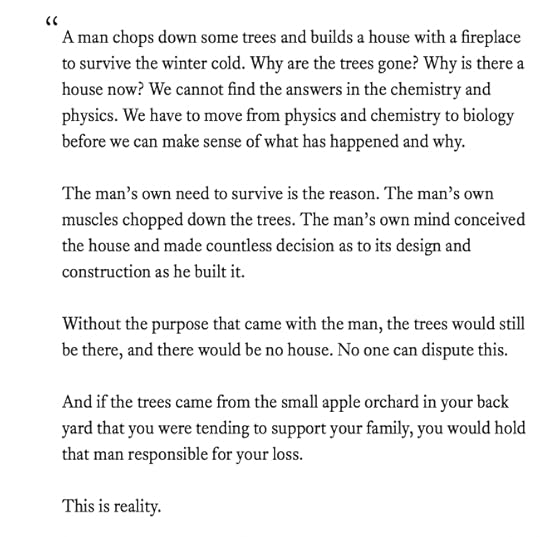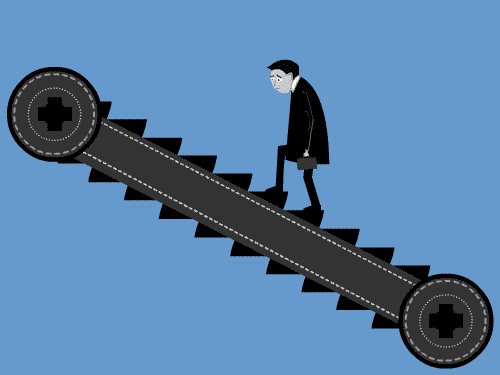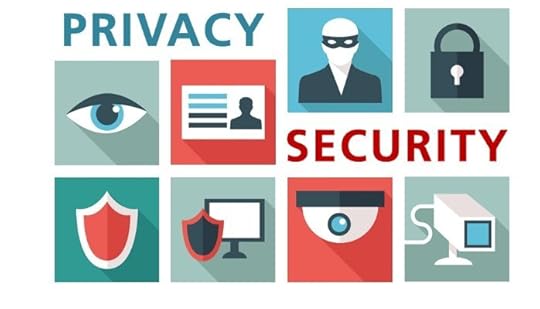Daniel Miessler's Blog, page 98
July 9, 2018
Why I Use a Single-screen iPhone Configuration
I recommend reading this in its native typography at Why I Use a Single-screen iPhone Configuration
—

There are lots of ways to organize the apps on your phone. You can have lots of screens of single apps, or you can have lots of screens of app folders, or you can have something in-between.
I do something simpler. I have one screen of apps, and everything else I have to invoke via the down-swipe.
Not only do I only have one screen, but the bottom row is empty, so it’s actually less than one screen.
This does a few things for me:
It’s more efficient to swipe down and type one or two characters than to search through multiple screens or folders.
Often times, when you swipe down to search for the app you want, it’s already there in the list at the top.
It constantly re-affirms my priorities. The apps I have on my (one and only) home screen are apps I am happy to spend time in. Everything else I want to have to spend effort to find and use.
A number of my time-wasting apps, like Reddit, News, and New Yor Times, are not on the home screen, so it’s harder to mindlessly click on them and disappear into a time warp.
This is a good thing.
Having a single screen of apps is a way to ensure you’re spending time on what you care about rather than what comes naturally.
This setup is also just far more efficient. You think having a hundred apps right at your fingertips on various screens is easier than searching, but this stops being true once you have two or three screens. Once you hit that threshold it’s faster to search, especially when the OS is predicting what you’re probably looking for.
In short, this setup keeps me both focused on what I want to be doing, as well as efficient when I do need to find an app that I don’t often use.
Try it out.
Notes
The text at the bottom of my screen is part of a custom wallpaper I made to look like it’s part of the phone.
—
I spend between 5 and 20 hours on this content every week, and if you're someone who can afford fancy coffee, please consider becoming a member for just $5/month…
Thank you,
Daniel
June 25, 2018
New Study Shows You Can Predict Credit Rating From Your Online Tech Fingerprint
I recommend reading this in its native typography at New Study Shows You Can Predict Credit Rating From Your Online Tech Fingerprint
—

For anyone who’s been worried that their online fingerprint was going to be used against them, this paper will provide them their vindication.
Here’s how they describe the analysis:
As a simple example, every website can effortlessly track whether a customer is using an iOS or an Android device; or track whether a customer comes to the website via a search engine or a click on a paid ad. In this project, we seek to understand whether the digital footprint helps augment information traditionally considered to be important for default prediction and whether it can be used for the prediction of consumer payment behavior and defaults.
Fair enough, but from there it just gets scary.
None of this is surprising to me. I’ve been arguing that this is what big data and machine learning are going to bring us for a long time. But it’s still startling to see it happen.
They proceed to look at all the various markers we leave behind online, that companies could look at while you’re on their website (or if they buy the data from somewhere else) to add to your credit score to determine your chance of default.
What if a company wants to estimate your creditworthiness (or other types of worthiness) without pulling your credit? They can do this analysis, or something like it, for free by looking at all this public information you drop while using the internet.
Not only will companies do this while you’re on their website (they can easily tell your OS just by showing up, along with the site you came from, and if they’re getting data from you they can learn where you live, what your email address is, and tons more data they can use to rate you.
And these things evidently matter a lot in predicting default.
When combining information from both variables (“Operating system” and “Email host”), default rates are even more dispersed.15 We observe the lowest default rate for Mac-users with a T-online email address. The default rate for this combination is 0.36%, which is lower than the average default rate in the 1st decile of FICO scores. On the other extreme, Android users with a Yahoo email address have an average default rate of 4.30%, significantly higher than the 2.69% default rate in the highest decile of FICO scores.
In general, there were a few things that jumped out as predictors.
iOS vs. Android (iOS users were around half as likely to default)
Emails with name in them were better
Desktops defaulted far less than mobile
People with numbers their emails defaulted more
People with old domain emails (Hotmail, Yahoo) defaulted more
People who ordered at night instead of in the afternoon defaulted more
The most interesting thing about this is how easily this stuff can be (and is) gathered from users just during a regular browsing session. Especially if you’re on the website itself that is going to making the decision.
These tech fingerprint ratings are as good as or better than actual credit scores.
To me, this is what big data is all about. It’s not what it should be about. But it is what it’ll be used for. And it already is.
Big data combined with machine learning has only one purpose, and that is to answer questions and make predictions.
The question and prediction of, “Will this person pay me back?” is one of the oldest in human history.
Expect AI and data science to focus on questions like those first.
And if you were worried that your internet droppings might one day be used to judge you, don’t worry anymore.
It’s absolutely true, and it’ll only become more so as the technology advances.
—
I spend between 5 and 20 hours on this content every week, and if you're someone who can afford fancy coffee, please consider becoming a member for just $5/month…
Thank you,
Daniel
June 23, 2018
What The Code of Hammurabi Can Teach Us About Hardware and Software Liability
I recommend reading this in its native typography at What The Code of Hammurabi Can Teach Us About Hardware and Software Liability
—

The Information Security community has been debating software reliability for decades. Some say software is too advanced to place guarantees on it. And others say that unless we hold creators/builders responsible, nothing will improve.
Nassim Taleb’s Skin in the Game is what got me thinking about this topic.
As it turns out, the most ancient law that we know of, from 4,000 years ago, has a lot to say about this. The Code of Hammurabi is our earliest known set of official laws, and it comes from Babylonian civilization in Mesopotamia.
What’s remarkable about it is not just how it tells you not to steal or kill, but how it focuses on things like making charges against people without proof, and building and selling things without standing behind them.
It basically says that need to be an upstanding citizen in all affairs. And if you are lazy, selfish, or otherwise do things that cause other people harm, then the law will punish you.
Here are some callout examples related to creating things that other people use.
228: If a builder build a house for some one and complete it, he shall give him a fee of two shekels in money for each sar of surface.
This is how much you can charge for software.
229: If a builder build a house for some one, and does not construct it properly, and the house which he built fall in and kill its owner, then that builder shall be put to death.
I can think of a few software products that fell in and killed their owners.
232: If it ruin goods, he shall make compensation for all that has been ruined, and inasmuch as he did not construct properly this house which he built and it fell, he shall re-erect the house from his own means.
Yep, you’re on clean-up duty. And you’re paying for the damages.
233: If a builder build a house for some one, even though he has not yet completed it; if then the walls seem toppling, the builder must make the walls solid from his own means.
Something something beta software.
235: If a shipbuilder build a boat for some one, and do not make it tight, if during that same year that boat is sent away and suffers injury, the shipbuilder shall take the boat apart and put it together tight at his own expense. The tight boat he shall give to the boat owner.
If your software starts sinking before a year has elapsed, you need to tighten up that codeboat for free.
That’s pretty potent stuff for 4,000 years ago.
Nassim Taleb points out how deeply these concepts have penetrated our soecieties through time, giving examples like:
Ceasers couldn’t just rule from the throne; they were fighters on the front lines in order to earn that respect back home
Roman commanders would be held accountable for losses
Bridge builders had to sleep under their bridges for a period of time, with their families, to show that they stood behind (under) their work
I do think there is a fundamental difference between a building and a piece of software. The former has quite a small number of variables in it, and it’s much easier to blame the builder when it goes wrong.

With software, it’s so new and ridiculously complex that everyone (including the builder) is surprised it works at all.
The law have been dated to around 1754 BC.
But I think there’s still something to this. Especially as we start talking about building an Internet of Things upon which we’ll stack our new society.
At some point, the software becomes a lot more like a building. Not because it’s easier to build, but because it can actually fall down and kill people.
The central concept here is what Taleb calls Skin in the Game, which seems to be largely what the Code of Hammurabi was about. You couldn’t just claim things, or take things, or make things.
To the extent that your actions affected others, there were consequences.
My Slow-motion IoT Train Crash analogy
I’m not saying that this maps perfectly to building software in 2018, but it will likely become a lot more similar when software failures become matters of public safety.
—
I spend between 5 and 20 hours on this content every week, and if you're someone who can afford fancy coffee, please consider becoming a member for just $5/month…
Thank you,
Daniel
June 21, 2018
My Thoughts on America in June of 2018
I recommend reading this with its proper typography at My Thoughts on America in June of 2018
—

I’ve been writing more defined and concise posts lately—usually clean ideas that have a beginning and an end. I like it, and I plan to keep doing it.
But not today.
Today I just need to write. Today this will be an old-school blog, or a journal.
There are a lot of things happening in America right now. I cannot help but feel that Trump’s election was our definitive shark jump, and I’m not sure what we can do to grow the beard.
I find it truly remarkable that we’re watching in real-time while a KGB agent, basically the head of the new KGB (and Russia itself) is actively managing the President of the United States as an asset.
Unbelievable.
Imagine being a new CIA recruit right now, learning the signs of someone who’s being managed. Or how to apply leverage to get what you want.
Imagine someone adding that up for the first time as they think about our current president, and turning white with horror.
I wrote this back in 2016:

That seems pretty solid right now. I mean, let’s look at the moves that Putin (Trump) has made:
Make Canada an enemy
Start a trade war with China
Pull out of the human rights community
Make friends with North Korea
Completely alienate Europe
Put 2,000 defenseless children in internment camps
Canceled Christmas
Technically he didn’t do the last one, but there’s still time.
The point is these all seem like precisely the moves that an enemy would want us to make, and specifically that Putin would love us to make.
Putin needs to break up the coalition that’s against him, and that’s exactly what’s happening. Once that’s out of the way he can move aggressively and nobody will oppose him. Or, more accurately, many small and disjointed groups will oppose him—but not a unified voice backed by unified force.
There’s also a flaw in taking this theory of Putin control too far, as I do think he’s truly random and chaotic. So Putin is leading a wet and hungry cat, not a loyal dog.
Why is a 70-year-old billionaire trying to grow a business anyway? Why not relax and people play golf? Oh yeah, he’s an egomaniac. Anyway.
American society is changing
I think the primary change that’s happening to America is that it’s becoming another part of the world.
The Chinese are coming, with their new found wealth, and buying things up. Much of the real estate in the Bay Area is owned by Chinese, who are super disciplined (high grit) and so they have the money to spend on down payments.
In my old town the nightlife is dominated by Cofee/Tea/Pastry bars full of basically 100% Chinese people, who seem quite wealthy, and with no other groups in sight. And as far as I can tell, they’re recently here from China—not Americans whose parents are from China.
The point is, this change is happening very quickly. America will just be another place full of rich and poor people. The races will separate from each other. The rich and poor will separate from each other. And it’ll be just like everywhere else.
In most moods I see this as a good thing. I see it as inevitable. I see it as progress (the part where it becomes more like the rest of the world, not the rich separation part).
But in some moods I feel like America is special, and that we should keep this equality and populist concept from the 50’s, where the boss only made like 3-5x what you made. And everyone still lived in the same neighborhood.
It’s not like that at all now. Not anymore.
The rich and poor live in different universes. Even if they’re just a mile or two apart. For the young Indian and Chinese kids of educated and recently-arrived parents, the kids are on absolute fire. They are energetic, they study constantly, they’re planning for college early in high school, and they’re talking about their first jobs and their careers.
Across town, where I’m from, there’s a dullness to the kids’ eyes. They’re showing up. They’re all on Android phones (not a single Android in the other coffee shop), and nobody’s talking about college.
These are all anecdotes, and anecdotes—even in numbers—aren’t data. But the data show the same thing: the rich are pulling away. And as I write about in other pieces, it’s based on a cultural mindset that the soon-to-be rich are instilling into their kids.
They’re teaching them to delay gratification (grit), to focus on education and career, and to see the world as a competition that you have to win.
The sad truth is that while it’s cynical to see the world this way, parents who don’t, and the kids of parents who don’t, are going to be making these kids their food, and washing their cars. That’s the reality.
Where was I?
Russia. Right.
So, the KGB is controlling our dear leader.
The chess moves are dissolving alliances that will enable Putin to move aggressively in Europe and elsewhere.
The U.S. is moving from being flat and equal, to being stratified by a new rich class coming from Asia and also being grown here as well, largely by immigrant parents with education and strong work ethic.
America is becoming just another country.
That’s the punchline I think. America is just going to be a place.
It had to happen eventually, if we were going to get to Star Trek. That’s always been my ideal destination anyway, so bring it on.
But Star Trek is very equal. It’s equal because money has stopped being the focus, replaced by intellectual curiosity, public service, and other higher pursuits.
We’re very far from that right now. The furthest we’ve been in decades.
People are pulling inward. Especially the older, more conservative (see racist) types living in the rural areas and in the center of the country (not all, obviously, don’t spam me).
We saw that with Trump’s election, and we saw it with Brexit.
But not everything is bad.
The young people are more liberal than ever. They’re more racially open than ever (unlike recent immigrants who tend to have the strong racism of the home country).
They’re more open to free sexuality choices, they’re not religious, and they’re tired of the story that the big government and corporations are there for everyone’s best interest.
Those are good things.
I just worry about the mental health aspect. People are miserable. They have no meaning in their lives. They realized religion is bunk. They want to worship consumerism but they either did that and found out it was empty, or they’re too poor to even get started.
So suicide is rising. Opiate use is out of control. Gun violence in schools because the kids have no idea how to demand meaning in their lives other than to do something spectacular that is guaranteed to get everyone’s attention.
There’s an incel movement where some subset of these kids are uniting in feeling unseen and unrespected by women, so they think it’s ok to lash out because of it.
Go play some D&D like a regular dork, go to college, get an education, meet someone. Enter the world. It’s the only path.
But it’s not their fault because they’re not being taught this. They’re being told that if they work hard everything will be ok. Or maybe they’re not being told anything because their parents are busy on social media or working 3 jobs and not raising them.
Lots of problems, lots of causes.
I wrote this post and created this calculator to help people tactically move out of depression.
But the result is the same: people growing up with no path to meaning. No way of tangibly pursuing happiness. Nothing to do but escape and/or lash out.
This is definitely true in the U.S., but I think it’s happening globally as well, in different ways.
This is going to sound strange coming from an atheist, but the fruits that were offered by secularism came with some toxins as well. The most dangerous of which is the lack of a meaning structure.
The modern world keeps eliminating primitive struggle from our lives. We don’t have to try to survive anymore. Or to be full. Everything is given to us by fast food and delivery.
The poorest people are the most obese.
But while secularism cleared a lot of fallacies, and bigotry, and myths, and harmful stories, it also stripped away the underlying message of struggle.
Humans aren’t happy unless they’re reliving the early days on the African plains to some degree. Shelter, reproduction, safety, food, etc. It’s not having these things that makes us happy, it’s earning them.
It’s hard to earn things these days. That’s the problem.
They’re either given to us (not earned), or they’re impossible to earn no matter how hard you try.
That’s a problem for humanity. Hence opioids and suicide and school shootings.
Anyway, I’m going to stop here.
We have opportunity. And we have challenge.
I am skittish. I am optimistic.
—
I spend between 5 and 20 hours on this content every week, and if you're someone who can afford fancy coffee, please consider becoming a member for just $5/month…
Thank you,
Daniel
June 17, 2018
Tactical Advice for Clearing Depression
I recommend reading this in its native typography at Tactical Advice for Clearing Depression
—
I have been drawn to questions of happiness and fulfillment for much of my adult life. I’m not sure the reason for that, but I think it’s a combination of some things in my family history, it being an extremely hard problem, and the fact that so many people I know are deeply unhappy.
The suicide rate in the United States is up over 30% since 1999.
When I hear a friend or associate talking about how sad or empty they feel, I immediately jump to thinking about assessment and remediation—whether or not I share my thoughts with them at the time. I usually just spend a long while listening because I’m not sure how and when to give the advice that helps me.
But for myself, I’ve now come to trust my own diagnostics and the behaviors that I use to control my own mood, and I wanted to share them here in case they can be of use to someone else. Essentially, the depressed people in my life are all engaging in identical positive and negative behaviors.
My primary observation is that unhappy people seem to be largely doing—and not doing—the same exact things.
And it’s not just that people who I hear about being depressed seem to be doing the same things—it’s that these are also the same activities I find myself doing when I’m not happy. So there seem to be clear, predictive activities that apply to many people, which I found both fascinating and useful.
Once I figured that out, I built this methodology to measure and adjust my own happiness and efficiency. The activities are listed in the table above, but in general most depressed people I know share these characteristics:
A number of recent studies have shown that weight-lifting relieves depression very quickly.
They’re not physically active.
They consume extraordinary amounts of social media, video games, and/or television.
If they’re on social media like Facebook and Instagram for multiple hours per day, it’s often to compare how happy other couples and celebrities are compared to their life.
If they’re in a high-status profession, they’re often comparing their popularity to that of other people in the field, and obsessing over why people don’t like them or respect them.
Why you should Beware of Alternate Meaning Loops
If they’re into video games, they’ve basically replaced their life meaning loops with alternative meaning loops, which makes the regular world a sad place to escape from.
They’re not working on any long-term positive projects of their own.
When you feel off-balance, calculate your scores
So here’s the prescriptive part. This is what I do when I don’t feel as motivated about my projects, don’t feel energetic, or feel any sort of unexplainable unhappiness.
I used to think I just wasn’t happy at that moment, and I would just let it pass. But now I quickly rank myself on all the activities that I know for a fact make me feel good or bad.
Now, as soon as I feel even a moderate disturbance in the force, I ask myself:
Have I played table tennis or worked out in the last few days?
Have I been on social media for too long? (too much external focus)
Have I been reading too much news (stuck on Reddit or Feedly)
Have I consumed any high-quality ideas lately (not enough reading and thinking)
Have I been listening to music?
Basically 100% of the time, I instantly recognize that I’ve either been too busy to exercise, to read, or I’ve been spending too much time looking at what other people were doing instead of working on my own projects.
And when I calculate my scores using my methodology I end up in the negative hundreds—or even over a thousand.
When this happens immediately stop consuming media, I get in the car, put on an audiobook, and I drive somewhere to play table tennis or lift weights. I feel better within minutes of doing this, and over the course of multiple days I reach my creative, temperament, and output peak, which is basically a sustained and gentle euphoria.
Predictably. Every…Single…Time.
What strikes me as so profound about this is not that having a low score can sometimes make some people sad—it’s that if you have a low score you’re almost guaranteed to be depressed.
And then weeks or months later, when life gets in the way, or Reddit or Twitter call to me too much, and I get sucked in…I stop working out. I stop exercising. I stop walking. I go for too long without reading and thinking (and therefore writing), and I slip back into The State of Blah.
When that happens, I now know to simply do the following:
Stop
Calculate my scores
Stop doing the things on the right
Start doing the things on the left
In other words, it’s basically impossible to be happy if you are scoring low on this calculator, so you shouldn’t be surprised if that’s the case. You should expect it.
Summary
I am not a doctor, and I am not Tony Robbins. This is just a practical system that I built to solve the problem for myself.
If you are not happy, or frequently feel The Blah, look at these activities and calculate your scores for the last week.
It is my prediction that if you are not feeling happy, your score will come up in the negative hundreds for the last 7 days, and that if you are feeling good your score will come up in the positive hundreds for the last 7 days.
If you’re in the negative hundreds, you’re almost guaranteed to feel depressed, so don’t feel bad about that. We know the reason!
Make the adjustments by avoiding the stuff on the right, and doing the stuff on the left.
I hope you try the system, and that it helps you as much as it’s helped me.
Take care!
Notes
I have not done extensive study on each of these activities and their efficacy for large groups of people. This entire post is based on being very close to people who are depressed for multiple decades of my life, seeing what works for me when I feel less positive, and absorbing many, many books on happiness and fulfillment. Do not take that as authority, because I don’t think it’s possible to have such a thing in this matter. This is just my best attempt to help people in this situation.
Another thing that strikes me about this is that these seem to be the activities that Americans as a whole are doing (and not doing) as well. That obviously requires a lot of study to say definitively, but I would not be at all surprised if these activities were shown to be similarly helpful or harmful in the larger population.
I am fully aware that this type of system only works for people with certain (hopefully the most common) types of depression, and not for people who have serious mental health or biologically caused situations that I have no expertise in, and which science is still figuring things out. I am absolutely not claiming that doing this will solve situation x, y, or z that you know of where there was a severe imbalance of some sort. I’m simply claiming that there are many situations that may look like that which could actually be treated best by doing these things.
My advice is to talk to a solid mental health professional if you are dealing with depression, and to ask them what they think of these activities if you have any doubts about them. I would guess that they’d recommend you do whatever they’re telling you, and that you could/should do these things as well because they couldn’t hurt. Or perhaps they’ll like the approach and will endorse it. But the point is that you should ask a professional if you have any concerns.
—
I spend between 5 and 20 hours on this content every week, and if you're someone who can afford fancy coffee, please consider becoming a member for just $5/month…
Thank you,
Daniel
My Tactical Advice for Clearing Depression
I recommend reading this with full typography at My Tactical Advice for Clearing Depression
—
I have been drawn to questions of happiness and fulfillment for much of my adult life. I’m not sure the reason for that, but I think it’s a combination of some things in my family history, it being an extremely hard problem, and the fact that so many people I know are deeply unhappy.
And this is far more than anecdote. The suicide rate in the United States is up over 30% since 1999.
When I hear a friend or associate talking about how sad or empty they feel, I immediately jump to thinking about assessment and remediation—whether or not I share my thoughts with them at the time. I usually just spend a long while listening because I’m not sure how and when to give the advice that helps me.
But for myself, I’ve now come to trust my own diagnostics and the behaviors that I use to control my own mood, and I wanted to share them here in case they can be of use to someone else.
My primary observation is that unhappy people seem to be largely doing—and not doing—the same exact things.
And it’s not just that people who are sad seem to be doing the same things. Those are also the things that I find myself doing when I don’t feel as happy. They seem to be clear markers that apply to many people—me included.
That was compelling to me, so I turned them into a methodology that I’ve been using to keep myself in my optimal state of happiness and efficiency. The primary observations are listed in the table above, but in general, most depressed people I know share these characteristics.
A number of recent studies have shown that weight-lifting relieves depression very quickly.
They’re not physically active.
They consume extraordinary amounts of social media, video games, and/or television.
If they’re on social media like Facebook and Instagram for multiple hours per day, it’s often to compare how happy other couples and celebrities are compared to their life.
If they’re in a high-status profession, they’re often comparing their popularity to that of other people in the field, and obsessing over why people don’t like them or respect them.
If they’re into video games, they’ve basically replaced their life meaning loops with alternative meaning loops, which makes the regular world a sad place to escape from.
They’re not working on any long-term positive projects of their own.
When you feel off-balance, calculate your scores
So here’s the prescriptive part. This is what I do when I don’t feel as motivated about my projects, don’t feel energetic, or feel any sort of unexplainable unhappiness.
I used to think I just wasn’t happy at that moment, and I would just let it pass. But now I quickly rank myself on all the activities that I know for a fact make me feel good or bad.
Now, as soon as I feel even a moderate disturbance in the force, I ask myself:
Have I played table tennis or worked out in the last few days?
Have I been on social media for too long? (too much external focus)
Have I been reading too much news (stuck on Reddit or Feedly)
Have I consumed any high-quality ideas lately (not enough reading and thinking)
Have I been listening to music?
Basically 100% of the time, I instantly recognize that I’ve either been too busy to exercise, to read, or I’ve been spending too much time looking at what other people were doing instead of working on my own projects.
I immediately stop consuming media, I put on a book in my queue and I drive to play table tennis or to the gym to work out.
It’s almost as if it’s impossible for me to feel bad if my score is in the hundreds, and impossible for me to be happy if it’s in the negative hundreds.
Within a few hours I immediately feel better, and over the course of multiple days of this I reach my creative, temperament, and output peak, which is basically a sustained and gentle euphoria.
Predictably. Every time.
And then as soon as life gets in the way, or Reddit or Twitter call to me too much, and I get sucked in, I stop working out. I stop exercising. I stop walking. I go for too long without reading and thinking (and therefore writing), and I slip back into The State of Blah.
And the cycle starts again…
Stop
Calculate
Change behaviors
Summary
I am not a doctor, and I am not Tony Robbins. But I’m pretty good at managing my mood and creativity, and I have over the years built a diagnostic system and activity set that helps me maintain my ideal mental state.
If you are not happy, or frequently feel The Blah, look at the activities above and calculate your scores for the last week.
It is my prediction that if you are not feeling happy, your score will come up in the negative hundreds for the last 7 days, and that if you are feeling happy your score will come up in the positive hundreds for the last 7 days.
That level of difference is hard to ignore, and it should tell us something!
Try the system, let me know if it works for you, and help me to improve it.
A lot of people need something like this right now…something they can do—right now—to improve their motivation and their mood.
This works for me, and I hope it works for you as well.
I have not done extensive study on each of these activities and their efficacy for large groups of people. This entire post is based on being very close to people who are depressed for multiple decades of my life, seeing what works for me when I feel less positive, and absorbing many, many books on happiness and fulfillment. Do not take that as authority, because I don’t think it’s possible to have such a thing in this matter. This is just my best attempt to help people in this situation.
Another thing that strikes me about this is that these seem to be the activities that Americans as a whole are doing (and not doing) as well. That obviously requires a lot of study to say definitively, but I would not be at all surprised if these activities were shown to be similarly helpful or harmful in the larger population.
I am fully aware that this type of system only works for people with certain (hopefully the most common) types of depression, and not for people who have serious mental health or biologically caused situations that I have no expertise in, and which science is still figuring things out. I am absolutely not claiming that doing this will solve situation x, y, or z that you know of where there was a severe imbalance of some sort. I’m simply claiming that there are many situations that may look like that which could actually be treated best by doing these things.
My advice is to talk to a solid mental health professional if you are dealing with depression, and to ask them what they think of these activities if you have any doubts about them. I would guess that they’d recommend you do whatever they’re telling you, and that you could/should do these things as well because they couldn’t hurt. Or perhaps they’ll like the approach and will endorse it. But the point is that you should ask a professional if you have any concerns.
—
I spend between 5 and 20 hours on this content every week, and if you're someone who can afford fancy coffee, please consider becoming a member for just $5/month…
Thank you,
Daniel
June 16, 2018
Free Will’s Absurdist Paradox
You should read this article in its intended typography at: Free Will’s Absurdist Paradox
—

Picasso’s Portrait of Ambroise Vollard, 1910
Philosophers and scientists have been debating the concept of free will for centuries. While there are many nuances and subtleties, there are generally three main positions.
Libertarian Free Will is the idea that we have a completely free will that is not significantly determined by our makeup or our surroundings. Basically, our choices are our own, and physics and environment might have an influence but don’t ultimately determine anything. Most modern believers in Libertarian free will believe in a supernatural God that gave them this freedom.
Compatibilists believe the world is deterministic—meaning that outcomes are ultimately determined by a set of initial conditions combined with the laws of physics (which likely include randomness). But they believe we can still have free will within this deterministic framework, i.e., they believe free will is compatible with determinism.
Incompatibiists also believe the universe is deterministic, but they believe that a world constrained in this way offers no room for a free will.
Most people actively debating this topic today have long rejected the Libertarian possibility and are therefore discussing what’s possible within a deterministic framework that both the compatibilists and incompatibilists agree is true.
This brings us to why we care at all, and continue to discuss the matter, which inevitably reduce to questions of morality.
Compatibilists have a number of powerful arguments on their side.
We experience choice, therefore we have it
The kind of free will that we experience is the only kind that’s possible, so we should stop thinking about the kinds that are impossible due to Determinism (Daniel Dennett)
We cannot, as humans, practically live as if we don’t have free will
Believing we have free will is useful to us as a society because if we told people they didn’t have free will they would stop behaving morally
The model of humans making choices is the most useful way to describe what happens in the real world on a day to day basis (Chris Meyers)
Incompatibilists have their points as well.

If we agree that Determinism is true, and that we don’t control the universe or the laws of physics, then it’s not possible to control any higher-level phenomenon either
If you could not have done otherwise for any previous decision (because Determinism is true) then you also cannot do otherwise for your next decision
Just because we experience making choices doesn’t mean that’s happening. We also experience the color red, or being filled with the Holy Spirit, and these things don’t exist independently from being experienced by someone
We have already show in numerous studies that humans can be made to think that they made a decision on their own when the outcome was externally generated, and the human can’t tell the difference
Believing in free will justifies the concepts of reward, blame, and punishment, and negates any requirement to explore the physical, biological, and environmental causes of undesirable behavior
Until a couple of years ago I listed myself firmly among the Incompatibilsts.
Absolute vs. Practical Free Will
It seems obvious to me that once a choice was made in the past—in a mechanistic world—then each outcome unfolds the only way it could have gone. And since we’re talking about determinism, we don’t have any control of the variables. From there it’s an easy move to see that all your future choices are exactly the same.
That’s open and closed for me, and it’s why I’m still also an Incompatibilist.
I say “also” because Incompatibilism isn’t enough. What I’ve come to learn is that the problem with Incompatibilism is not that it’s wrong, but that it’s incomplete. It insists on prioritizing the abstracted world of quarks, atoms, and molecules, instead of the human world we actually live in.
And that’s the point some Compatibilists have been making all along. Here’s a great example by Marvin Edwards.

This passage is the most powerful attack on Incompatibiism that I’ve ever seen. Of course the configuration of the universe is actually responsible for those trees coming down! Of course the human is just a configuration of quarks! And of course the person who removed the trees had no free will! As it turns out though, this “reality” usually doesn’t matter in a world where humans build houses and need trees to feed families.
But as strong as this argument is, it still doesn’t make me want to be a Compatibilist, and nor should it for anyone else. Compatibilism would be fine if it were just saying, “We know free will doesn’t exist, but we think we should mostly behave as if it does”.
Compatibilism would be more correct if they were just saying that we should behave as if we have free will even though we don’t. But that’s not what they’re saying.
What they’re saying is that free will is compatible with determinism. It’s the actual definition of Compatibilism. They’re saying we actually have free will.
And that’s precisely what leads us to this paradox. We’ve established that Incompatibilism is not wrong, but rather orthogonal to human existence. And we’ve established that Compatibilism is wrong because we cannot actually have choice in a deterministic world.
So what we’re left with is—quite literally—an Absurd human existence.
Examples from human experience
The best way to see this is to imagine all the real-world situations that break either the Compatibilist or Incompatibilist narratives, and demand a new model in their place.
You feel like you haven’t been trying hard enough to improve yourself, and while laying in bed you make a personal vow to get back into your projects and actively pursue your goals.
A man who’s tortured and killed multiple people in his life is shown in 2027 to have a set of genes that are associated with psychopathy, and he’s in the courtroom facing a judge and some of the victim’s families.
You tell a friend, or a colleague, that they should do x or y, instead of z.
In the first case, if you’re an Incompatibilist, why are you having an internal dialogue with yourself about improving your life? Who is talking to who? And since there is no free will, what exactly are you trying to change? Absurd.
Thanks to Sam Harris for first using this tumor vs. genes illustration to clearly illustrate the problem.
So we have a murderer who doesn’t have a giant tumor in his head, which would make it fairly obvious he was under a negative influence during his actions, but instead we find out that his genes themselves are tumors telling him to do the wrong thing, and he clearly didn’t pick those for himself. Absurd.
And finally we have the big one. The very concept of “should” is completely inert in a world where free will does not exist.
Why do we try to be better people?
Why do we dislike bad people?
Why do we try to create anything?
Why not lay in bed and wait for the universe to just happen?
As logically-minded Incompatibilists we simply must accept that believing there is no free will must invalidate the entire concept of “should”, including everything that comes with it.
Planning. Praise. Punishment—all these concepts pivot on the belief that there are options in human behavior.

This is how the Incompatibilist smashes into the paradox.
For logically-minded Compatibilists, the impact comes with the realization that you can’t hold people responsible for having brain tumors or bad genes that affect and control their behavior. And then extending that out to realize—in accordance with Determinism—that the entire world is just a large, comprehensive set of those constraints that we also don’t control.
My Evolutionary Explanation for Free Will
So think about where that leaves us as humans.
We’re speeding along on a molten rock, in the middle of vast emptiness, with the universe happening to us. We’re not making it happen. We’re observers. But because of the trick that evolution played on us, we experience our choices as if we made them.
This is the Absurdist Paradox of Free Will.

Just as Camus talked about with the lack of intrinsic meaning in the universe, and how we must live on despite that lack of meaning, we must also accept that we are not ultimately in control of anything in our lives.
The entire human endeavor—to survive, to interact, and to better ourselves—is unalterably immune to our choices and actions.
The difference between Existentialism, Nihilism, and Absurdism
Thus, the debate between the Incompatibilists and Compatibilists ends unrewardlingly in paradox. It’s not that one is right or one is wrong.
The reason the Compatibilist vs. Incompatibilist debate has continued without a victor is because the problem is actually the foundational disconnect between reality and human experience.
And yet we must live on. We must rebel. We must embrace the unique and beautiful experiences that we have as human beings, and pretend as if we are their authors. And we must work to better ourselves despite knowing it’s futile.
Why must we pretend this? Because the alternatives are far worse.
We could lie in bed and do nothing. Or we could go on a killing spree because at some, distant, molecular level there’s no such thing as pain.
But we live here. In this reality. In the world of the Absurd.
Here it does matter.
And here I choose to do my best.
Here I choose to fight.
—
I spend between 5 and 20 hours on this content every week, and if you're someone who can afford fancy coffee, please consider becoming a member for just $5/month…
Thank you,
Daniel
June 13, 2018
The Platform and Candidate That America Needs in 2020
You should read this article in its intended typography at: The Platform and Candidate That America Needs in 2020
—

America has been stumbling for quite some time due to its lack of adaptation to a changing world. The classes are separating again (as they always do when there’s no catastrophe), we’re about to lose even more jobs to automation and AI, and it’s becoming increasingly difficult for average Americans to afford basic items like rent, healthcare, education, and retirement.
40% of Americans can’t cover a $400 emergency expense without selling something or borrowing money.
Making things far worse is the fact that the political conversation has massively polarized, with collective insanity accumulating on both the left and the right, leaving very little ground for any moderates or centrists.
A lot of people think once the current president is removed or leaves, we’ll just go back no normal, but that’s foolish. The exact same forces and pressures that brought him in are still there, and if anything they’re looking to double down on their positions.
What the centrists like you and me need to realize is that the idiodic right is powered by the insanity of the left, and vice versa. The extremes are destroying our a ability to talk to each other, and therefore are destroying the country itself.
So we really have two separate problems:
The country is not doing well in a basic health sense, e.g., our infrastructure is failing, our education is getting worse, the classes are separating, our consumer debt continues to rise, etc.
We’re politically more divided than ever, and the two extremes are blaming each other with a shrinking and silent center caught in the middle.
The alternative to this is to have the Democrats nominate someone boring and unremarkable, and either get a second term or someone even worse from the right.
But there’s a solution. And I think it may be the only one.
America needs a radical centrist who will push innovation and core principles without apology.
We essentially need someone who’s willing to be just as aggressive and loud as a Trump / GOP character, but who will do so with goals that are aligned to America and the American people.
I’m not saying these are ideal choices. I’m saying we’re out of options and drastic action is needed.
In two words, we need someone with vision and courage. Here are a few possibilities:
A vocal scientist, like Neil deGrasse Tyson, who will be logical and efficient in how they address prioritization of problems. And who will hopefully have some measure of resistance to the corrupting nature of politics.
A popular personality, like George Clooney or Matthew McConaughey, who will walk down a centrist path in a way that most Americans can follow.
An innovator, like Elon Musk or Jeff Bezos, who can aggressively push a visionary agenda without being seduced by popularity contests or monetary enticements.
Getting an actor would make me sad, but could work. A scientist would be amazing, but I worry they’d be out of their league and quickly devoured. Which leaves our best option as a type-A innovator type.
The platform
So what should the message be for Jeff Bezos as President? It will need to do three things simultaneously.
Have clear and aggressive bullet-point goals and principles. We can’t have a candidate who’s simply against other things. They need to be about something themselves.
They have to rhetorically neutralize the Extreme Right.
They have to rhetorically neutralize the Extreme Left.
Here’s how I see the platform rhetoric that does all these simultaneously.
Related: The Lupus in Liberalism
Ideology
America is not a geographical location. It is an idea that has core values that we insist on upholding. We understand you like the opportunity here, or maybe your family has lived here for many generations, but if you don’t accept these principles you should find somewhere else to go.
People are allowed to be themselves, whether that’s heterosexual, homosexual, bisexual, transgender, or some combination thereof. If you claim to be a proponent of freedom, start with letting people be who they want to be and minding your own business.
Women are people, and people are individuals. Group differences between men and women cannot tell you anything about an individual’s capabilities or preferences within those groups. So you can both accept group differences and still treat everyone the same. In fact we insist on it.
Show the rich that we’re not against them.
It’s ok for people to have lots of money, especially when they have worked very hard or very long to achieve that success.
Show the liberals that we’re with them as well.
It’s not ok for people working very hard at the bottom, playing by all the rules, to be unable to afford rent, healthcare, education for their kids, and retirement for the future. There are forces, both in the government and in the private sector, that are causing this, and they need to be directly addressed.
Show the conservatives that we know a culture of hard work matters.
The cultures within America that emphasize grit and self-sacrifice to get an advanced education are those that are thriving, and those that don’t emphasize education or long-term aspirational goals are those who will suffer. We must both accept this and get as many people as possible to see the difference and strive for the former.
Defuse racial tension by letting white people enjoy their heritage like everyone else.
White people hereby have permission to be proud of their heritage. People of European descent have done some spectacular things in the world, and we owe much of our current advancement to those innovations. Great job, guys. So now every ethnicity is officially allowed to be proud of who they are. Now let’s stop talking about it. We are not races—we are Americans! Celebrate your kindness and your innovation, not the color of your skin.
Shame the racists and Nazis, and demonstrate that doing so is American.
America defeated Nazism in the 40s, and it was a high point for our nation. We defeated Nazism because it is based in racism and hatred. If you are a direct proponent of racism and hatred, then you should leave. There is no place for white supremacy, white nationalism, Nazism, or any similar ideology here. We’ll pay for your ticket to move your entire family, starting today, and we’ll revoke your citizenship on the way out. You are not wanted in America.
Illustrate that both sides have merit.
Most police are great citizens and are doing their jobs at protecting all of us. There is a small segment of police, which is far too large, that are extremely racist and aggressive towards Black people and this will hereby be aggressively diagnosed and treated, like the cancer that it is. And we will protect and celebrate the model majority in the meantime.
Address these ridiculous college movements.
Free speech is a democratic scaffold that cannot be attacked or diminished. People should be, and will be, allowed to express all manner of opinions that are not direct incitements to violence. If an idea is truly stupid, or truly evil, let the light of scrutiny and discussion destroy it rather than sending it to a dark damp basement to fester and mutate. Universities should exemplify this approach.
Hard no on extremist religions.
Finally, if you are part of a political party or religion that has racism, the denigration of women, or hatred for alternative sexual lifestyles as a central component, then that ideology or religion is not compatible with America. And neither are you. Pick a side, and embrace your decision by abandoning old-world bigotry or by finding another place to live.
Education
If only the rich are educated then we have failed as a country. If good teachers have to find other jobs in order to make money, we have failed as a country. And if we are not among the top 5 most educated countries in the world, we have failed as a country. We’ll start this journey by redirecting 1 trillion dollars in 2021 from the military budget to go directly into teacher salaries. This way we can keep the best people doing what they love and what the country needs.
Immigration
If you have ideological compatibility with America (see above), and you are industrious, educated, skilled, hungry for success, or otherwise ready to come here and work hard to thrive, then we welcome you. We care not what you look like, what food you like to eat, or what language you speak. You will be welcomed as a future American.
If you’ve here illegally but have been working hard for a long time we’re going to bring you into the formal process towards citizenship.
If you’re here illegally and have been a criminal or a parasite, you are being deported.
There will be no wall, because 1) it’s a stupid idea, and 2) it will not be necessary. We will control immigration by enforcing existing laws and holding businesses accountable for their decisions.
Innovation
America itself is an experiment, and one we’re quite proud of. And we believe in being exceptional. We are the inventors of so many of the advancements we have today, and we intend for that to continue. We will do that starting here in our own country, with its infrastructure. We will have the best healthcare, the best roads, the cleanest air, the most advanced cities, and the most innovative research and development in the entire world. And anyone in the world can come here, apply to become and American, and participate in the opportunity.
Summary
It is America’s time. Not the old America, where only the white people were happy because everyone else was invisible or worse. And not a new America where white people are disregarded or pushed aside. This America is for everyone, and it has no color.
We are about principles. Equality, kindness, and innovation.
And we will work with the world to be a citizen of the planet.
If you’re tired of this country being destroyed by the right, destroyed by the left, and spat upon by everyone who sees its flaws, then we’re looking for your support.
America has more potential than any country in the world, and by using this common-sense, centrist approach we’re going to ignore the political fringes that insist on living in the past and blaming others.
We are moving forward.
~ Jeff Bezos / Neil deGrasse Tyson | 2020
Well that was fun to write. I’m sure it needs to be added to, fixed, cleaned up, whatever. But if you have any ideas on what else should be in the platform, let me know.
What I like about it is that liberals will think I’m conservative, and conservatives will think I’m liberal. And I guess they’re both correct. That’s kind of the point. I’m neither and both, just as the country should be.
I am thinking about seriously floating it to some people who might be able to use it somehow. We know for sure that what we’re doing now, and what the Democrats are likely to offer, will only take us farther astray.
So we have to try something, and I think this our best bet.
—
I spend between 5 and 20 hours on this content every week, and if you're someone who can afford fancy coffee, please consider becoming a member for just $5/month…
Thank you,
Daniel
June 12, 2018
Security and Privacy Are Not As Different As People Think
You should read this article in its intended typography at: Security and Privacy Are Not As Different As People Think
—

There’s a common belief in InfoSec circles that Security and Privacy are related, but that they’re different enough to constantly mention the distinction.
I don’t think the difference should matter much to defenders much at all, and in fact if you look close enough the distinction nearly vanishes. They are simply different aspects of the unified goal of protecting information.
Security and Privacy are both about preventing unwanted outcomes related to data.
To see what I mean, let’s look at some definitions.
Procedures or measures used to protect electronic data from unauthorized access or use.
SOURCE: GOOGLE AGGREGATION
So, based on Google seeing and knowing about dozens of definitions for InfoSec, it summarizes it as protecting data from unauthorized use. I’d agree that’s a decent summary.
Then if we look at the overall Privacy definition we get something similar.
Data privacy, also called information privacy, is the aspect of information technology (IT) that deals with the ability an organization or individual has to determine what data in a computer system can be shared with third parties.
SOURCE: GOOGLE AGGREGATION
So, it’s the ability for someone to control how their data is shared—and presumably whether and how it’s collected in the first place as well. I also agree with that.
There’s also another red herring here around Privacy vs. Data Privacy. The original concept of Privacy is about hiding and not being made public, where Data Privacy is about participating in a digital society in a way that you feel comfortable with.
In my analysis, the only real difference here is context.
As a society and as consumers we care about controlling who has our information, and we try to make sure those trusted vendors do the right thing with it. That’s privacy in a consumer or public context.

image from teachprivacy.com
But as a security professional—or as a security organization within a company—you are already getting exposed to peoples’ data. The focus at that point is on doing your absolute best to make sure nobody collects or uses it in a way that’s not desirable.
And in that context there is little difference at all between Privacy and Security. In both cases you’re trying to avoid bad things happening to the data you’re protecting.

Image by Lisa Holloway
As it turns out, the etymology of the word Security is quite informative. It comes from Latin, and “Se” means without, and “Cura” means worry, or concern. So providing Security for your people means they’re free to play and work and enjoy life without constantly looking over their shoulder.
The word Security breaks down as “se” and “cura”, which is Latin for “without worry”.
Without Worry is the most succinct description of the goal of security I’ve ever heard, and it applies equally to both Privacy and InfoSec. It also allows us to reduce the discussion to first principles.
There are people and organizations.
They have data they care about.
They want to control how that data is collected, used, and protected.
As security professionals it’s our job to carry that out.
That’s it.
We’ve just described “Data Security”. We’ve just described “InfoSec”. And we’ve also just described protecting peoples’ Privacy.
All these concepts reduce to avoiding negative outcomes with regard to data we’re trying to protect, so let’s stop drawing thick and sharp lines between them when there’s no reason to do so.
Thanks to my friend Peter Albert for turning me onto the Latin etymology of Security. It’s been enjoyable to track other security terms and see their original meanings, and has also prompted me to keep learning more Latin in general.
If someone knows of a reason for a clear demarcation here that I’m missing, please let me know. I’m open to being wrong about this.
—
I spend between 5 and 20 hours on this content every week, and if you're someone who can afford fancy coffee, please consider becoming a member for just $5/month…
Thank you,
Daniel
June 6, 2018
Examined But Absurd (A Poem)
You should read this article in its intended typography at: Examined But Absurd (A Poem)
—

How strange it is that we live this way
Unable to know what we’ll say
We feel control that cannot be
And sense a freedom we cannot see
Some drive to push and conquer all
And those who don’t deserve to fall
But what’s deserve when no options exist
For the poor are just those with luck that missed
Love is reduced when it’s compelled
When choice is dashed congrats are felled
Though since my path is already set
At least it saves me from regret
Some can’t fathom why to strive
To struggle and fight when it seems unwise
Since either way the path will unfold
Thus our noble actions cannot be bold
Yet I’ll still struggle to improve today
But that’s just what a machine would say
I know it’s true, but it matters not
For a life in bed is all for naught
I see this folly and know it’s real
Yet the clarity doesn’t help with what I feel
Alas we must accept this life on rails
But still behave as if we sail
~ Daniel Miessler, 2018
—
I spend between 5 and 20 hours on this content every week, and if you're someone who can afford fancy coffee, please consider becoming a member for just $5/month…
Thank you,
Daniel
Daniel Miessler's Blog
- Daniel Miessler's profile
- 18 followers




